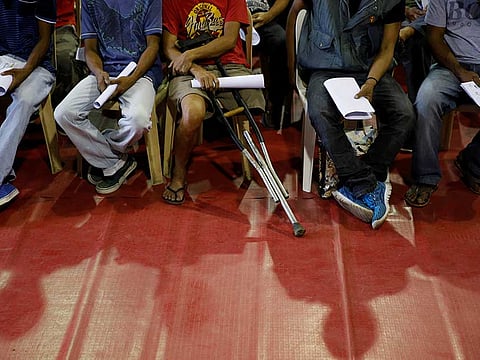Army camps to be used for rehabilitation of drug addicts
Reforming addicts could be given livelihood

Manila: The government will make use of its sprawling army camps across the country to rehabilitate tens of thousands of drug dependents, officials said.
Armed Forces spokesperson Brigadier-General Restituto Padilla said Defence Secretary Delfin Lorenzana has given orders to use major military bases outside of Metro Manila also as rehabilitation centres where drug addicts can reform and eventually get back to their normal lives.
Padilla said among those being eyed to serve as rehabilitation centres are Camp Capinpin in Tanay, Rizal east of Metro Manila, Fort Magsaysay in Central Luzon, Nueva Ecija and Camp Bahian in Malaybalay, Bukidnon.
He said the armed forces is taking part in efforts to rehabilitate and reform drug dependents upon the orders of President Rodrigo Duterte who had made peace and order as a centrepiece of his governance efforts.
“The rehabilitation of drug dependents will provide them with a second chance at life,” he said.
Drug use and abusive use of illegal substances such as crystalline methamphetamine, cocaine and heroin, among others, had been blamed for criminality that not only destroys the lives of the users, but also causes difficulties within families and tears the very fabric of society.
In the Philippines, the Dangerous Drugs Board said several hundred thousand of the more than 100 million inhabitants habitually use drugs.
Earlier, Guiling Tamondong, newly appointed administrator of the state-run Technical Education and Skills Development Authority (TESDA), said drug pushers and dependents would practically be given a second lease of life as rehabilitated citizens under a government skills training programme.
Mamondiong said TESDA will be opening its training centres all over the country for drug dependents and pushers who want to reform.
“This is in response to reports of convicts and inmates who resort to their old trades after serving time in jail because they have no other means of livelihood,” Mamondiong said.
“TESDA will take the lead in this endeavour, in cooperation with the Department of Interior and Local Government and the national police,” he said.
Other officials such as Senator Cynthia Villar said drug inmates could also be given livelihood and be provided with rehabilitation as farmers.
But those who would be provided with another chance at life could be considered lucky. According to independent reports such as that provided by the Philippine Daily Inquirer, the number of suspected drug pushers killed since June 30 to July 21 this year, when the Duterte administration assumed authority, has reached 364.
Duterte, during his first presidential address delivered on Monday, said the drive against drugs will continue without letup.
“We will not stop until the last drug lord, the last financier, and the last pusher have surrendered or been put behind bars or below the ground,” he said.
Sign up for the Daily Briefing
Get the latest news and updates straight to your inbox



